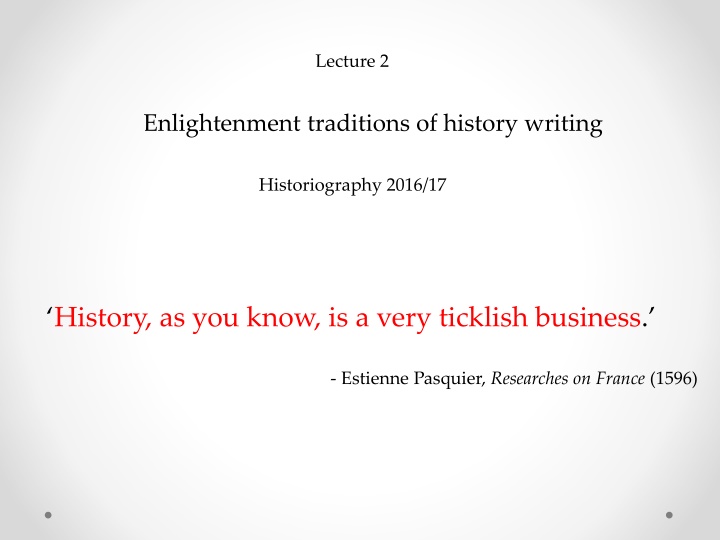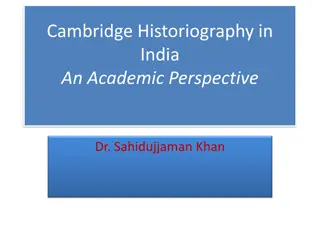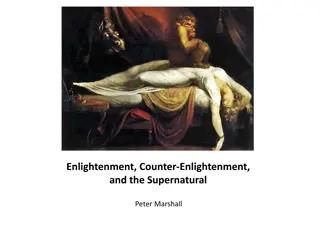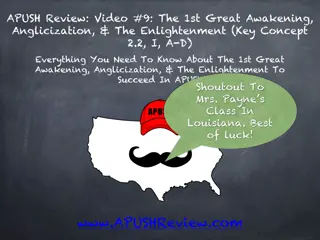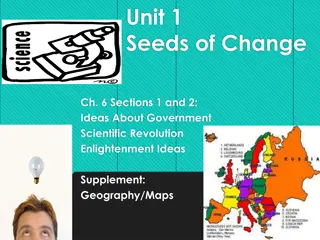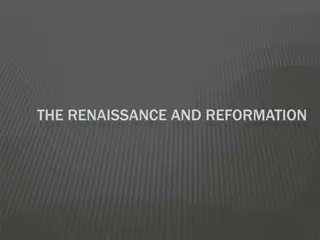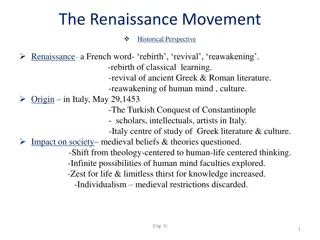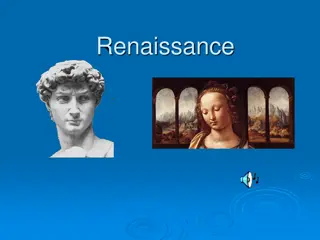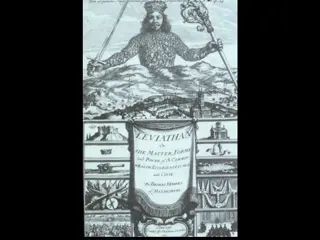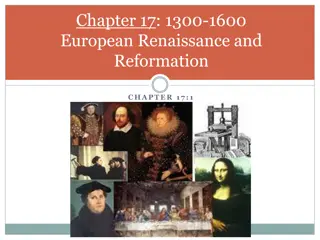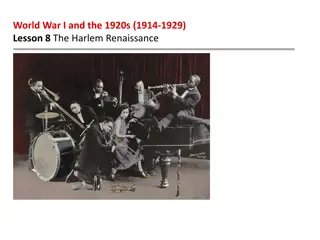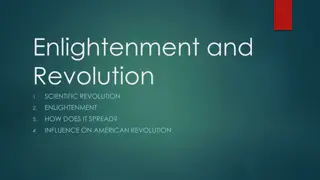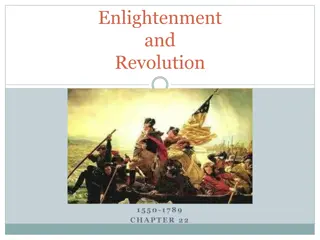Renaissance Historiography: Writing Histories in the Enlightenment Era
The Enlightenment period saw a shift in historical writing towards valuing the past for its own sake. Scholars like Francesco Petrarch and Estienne Pasquier explored different approaches to interpreting history, incorporating philology, individual chronicles, and the portrayal of great men and women. This era also witnessed a focus on national histories in France and England, diverging from the classical tradition of Ancient Rome.
Uploaded on Sep 10, 2024 | 1 Views
Download Presentation

Please find below an Image/Link to download the presentation.
The content on the website is provided AS IS for your information and personal use only. It may not be sold, licensed, or shared on other websites without obtaining consent from the author.If you encounter any issues during the download, it is possible that the publisher has removed the file from their server.
You are allowed to download the files provided on this website for personal or commercial use, subject to the condition that they are used lawfully. All files are the property of their respective owners.
The content on the website is provided AS IS for your information and personal use only. It may not be sold, licensed, or shared on other websites without obtaining consent from the author.
E N D
Presentation Transcript
Lecture 2 Enlightenment traditions of history writing Historiography 2016/17 History, as you know, is a very ticklish business. - Estienne Pasquier, Researches on France (1596)
Early Renaissance Histories Valuing the past for its pastness Our own age has always repelled me [ ] In order to forget my own time, I have constantly striven to place myself in the spirit in other ages, and consequently, I delighted in history. o 14th century humanist: Francesco Petrarch Ancient Rome was thought to be better medieval period as Dark Ages .
Renaissance Histories Philology: study of classical texts o Initially, classical texts as source for absolute standards o But to understand classical texts, one needed to understand the contexts of ancient Rome and of translations of classical texts through the ages. Thus, a historicist view developed, and with it, a relativist understanding of the past. (Same period as development of perspective in painting.) Individual Chronicles o First-hand accounts written in the vernacular (Italian city-states) o History as memory o History as full of contingent (and often recent) events: printing press, discovery of the New World, invasions, flourishing city-states o Narrative tropes inflected by knowledge of classical history (Rome): tragic decline.
Renaissance Histories Histories of Great men, Great women o Lives of notable individuals moral lessons o Women recognised as historical subjects and as readers of history But often in sexist way: women had specific virtues (chastity, silence, obedience) History was instructive for them more so than rhetoric or philosophy since it dealt with only facts (not reasoning or public speaking) Example titles o Vespasiano da Bisticci: Lives of Illustrious Men (late 15th century) o Giovanni Boccaccio: Concerning Famous Women (1365) o Christine de Pizan, The Book of the City of Ladies (1405) Women could be virtuous, too Used historical examples
French-English Renaissance Histories Unlike Italy, France and England did not have the illustrious tradition of Ancient Rome to celebrate More focused on the nation ; wrote in the vernacular o Estienne Pasquier sResearches on France (1560) o William Camden, Britannia (1586)
Historical Methodology in Renaissance People noted at the time that History lacked a set of rules o Historians as butts of jokes, especially by philosophers Q: What would you call the writer who told you about effects without looking for any causes? A: A historian. (Patrizi: Ten Dialogues on History) o History was an art in search of a scientific method What was history s purpose? o Moral instruction, the search for moral and political truths How should it be practiced? o Emphasis on factual accuracy and rigorous methodology or was rhetorical style more important for conveying moral lessons?
Types of Renaissance Histories Antiquarianism o Assessment and accumulation of facts. Technical and specialised. With intense scrutiny of evidence. Not widely read, but influential. Political History o More popular o Italian Renaissance: Machiavelli, Guicciardini o Cyclical history: from the rule of one, to the rule of the few, to the rule of the many, then back to the rule of one. o Focus on how morality and institutions interact in each phase of the cycle o French Renaissance: Jean Bodin - History for the most part deals with the state and with changes taking place within it. Method for the Easy Comprehension of History (1566)
Pre-Enlightenment Histories Legal history o French Renaissance: reconstruction of histories of rights, privileges and institutions. Focus on medieval era. o Emphasis on written archival sources over oral and secondary accounts o Discovery of feudalism grew out of this line of historicising in England Natural Law o Pufendorf, Hobbes, Grotius o From nature to civil society social contract o Historical stages characterised by the terms of property and modes of subsistence (socioeconomic as driving political history) Christian Universal History o Bossuet s Discourse on Universal History (1681) o Last grand attempt to explain history in terms of a relentless war between God and Satan.
Old View History was important in the Renaissance (15th and 16th c) and Romantic period (19th) The Enlightenment o emphasised the moderns over the ancients o Experimental methods (can t experiment on past societies) o Eternal natural laws are more important than pastness o Emphasis on Progress, not the Past Politicisation of this view: the French Revolution (Jacobinism embraces modernity and the future) Romantic Reaction to Jacobinism in 19th c: History returns as important
New View History was central to Enlightenment writing and philosophy David Hume, Scottish Philosopher and Historian o I believe this is the historical Age and this the historical Nation (1777)
Crisis of European Consciousness Thesis of Paul Hazard intellectual historian Epistemological shift between 1680 and 1715 One day, the French people were thinking like Bossuet. The day after, the were thinking like Voltaire. No ordinary swing of the pendulum, that. It was a revolution. o Paul Hazard, The European Mind, 1680-1715
What did Enlightenment historians take from the past? Reliance on written sources o Antiquarianism persisted, despite criticism of its narrowness Focus on nations and civilisations History as source for political and moral lessons Stages of History o Popularised in Cellarius sUniversal History Divided into an Ancient, Medieval and New Period (1690s)
Whats new? From cyclical to unilinear history (progress) Conjectural / Stadial histories Moral lessons (as before) but through sympathy Natural Laws discoverable through history o Social phenomena are subject to natural laws just like physical phenomena. Natural laws are discernible through empirical research. National but also cosmopolitan o Interplay of likeness and difference within the family of Christian churches and nations irony to make the familiar odd and the odd familiar
Cyclical History For Greeks: oscillations between good orders (democracy, monarchy) and bad ones (oligarchy, tyranny) Mythical: cycles stem from eternal unseen forces, such as the gods moods, or the range of men s fundamental character. Echoes of the cyclical in histories of the longue dur e and deep history. Rejection of progress, of constant new-ness
HISTORICAL PROGRESS What is Enlightenment? (Essay, 1784) Immanuel Kant, 1724-1804
Enlightenment is mankinds exit from self- incurred immaturity. Immaturity is the inability to make use of one s own understanding without the guidance of another. Sapere aude! (Dare to know, to use your own understanding!) This is the motto of the enlightenment. (From: Immanuel Kant, An Answer to the Question: What is Enlightenment? Berlinerische Monatsschrift (1784): 481-494, 481.)
It is now asked whether we live at present in an enlightened age? , the answer is: No, but we do live in an age of enlightenment. As matters stand now, much is still lacking for men to be completely able or even to be placed in a situation where they would be able to use their own reason confidently and properly in religious matters without the guidance of another. Yet we have clear indications that the field is now being opened from them to work freely towards this, and the obstacles to general enlightenment or to the exit out of their self-incurred immaturity become even fewer. From: Immanuel Kant, An Answer to the Question: What is Enlightenment? Berlinerische Monatsschrift (1784): 481-494, 481
Progress See Condorcet reading: Of understanding (proof: Enlightenment) Of humankind (proof: History)
A Treatise of Human Nature: Being an Attempt to introduce the experimental Method of Reasoning into Moral Subjects (1739) The History of England: from the invasion of Julius Caesar to the Revolution of 1688 (1754 61) , first published in installments. Not ancient constitution that mattered: History as evolution of political structures. Beyond absolutism, there was the rise of political liberty. Unintended consequences (Absolutism had provoked Puritanism, which kept the spirit of liberty alive will triumph in 1688.) Emphasis on national character. Progress: David Hume 1711-1767
How can we see history as linear progress/decline? Conjectural History A rational reconstruction or speculation of what must have happened to mankind in the past, even if it can t be empirically shown
Conjectural History Rousseau: Humans were born free and moral (or at least morally neutral) but civilisation corrupted them. (Discourse on the Origins of Inequality) Scottish historians would refute this.
Conjectural History Adam Ferguson Stadial History (stages) 1. Hunting no property, no wealth to accumulate, stage of savagery 2. Pasturage less mobile but still nomadic, wealth can be accumulated 3. Agriculture -- even less mobile, farmer live on land in own houses, more wealth and greater inequality 4. Commerce property ownership, laws governing property, complex societies
Moral lessons through sympathy Experience, or the experience of reading about past experiences,makes one feel history, empathise with others, absorb moral lessons, and become more virtuous
Hume, sympathy, history Why study history, according to Hume? Entertainment, which leads to erudition, accumulation of knowledge, and moral-intellectual improvement. A man acquainted with history may, in some respects, be said to have lived from the beginning of the world, and to have been making continual additions to his stock of knowledge in every century. (note: knowledge is accumulative) 3. History has the power to direct readers wills and make them become more virtuous; because historians do not possess the vice of self-love or self-interest.
Lectures on Rhetoric and Belles Lettres, 1762 The accidents which affect the human Species interest us greatly by the sympathetical affections they raise in us. We enter into their misfortunes, grieve when they grieve, rejoice when they rejoice, and in a word feel for them in some respect as if we ourselves were in the same condition. ( p. 90) The facts must be real otherwise they will not assist us in our future conduct, by pointing us the means to avoid or produce any event. Feigned Event and the Causes contrived from them, as they did not exist, can not inform us of what happened in former times, nor of consequences assist us in a plan of future conduct. (p. 91) Adam Smith, 1723-1790 Sympathy, knowledge, morality
Example of making people feel history: The Queen, worn out with fatigue, covered with dust, and bedewed with tears, was exposed as a spectacle to her own Subjects. Moral lessons through empathy with the the past (History of Scotland, 1759, vol. 1, p. 367) William Robertson, 1721-1793
History: the discovery of natural laws Before Enlightenment: History as art in search of a scientific method During Enlightenment: History as the science of human morality
NATURAL LAWS as discoverable (Newton) Hume and other historians were inspired by Newtonian experimental methods of reasoning: the empirical observation of human activities in the present and past. HUME: Mankind are so much the same, in all times and places, that history informs us of nothing new or strange in this particular. Its chief use is only to discover the constant and universal principles of human nature, by showing men in all varieties of circumstances and situations and furnishing us with materials from which we may form our observations and become acquainted with the regular spring of human action and behaviour (Hume, Enquiry Concerning Human Understanding, pp. 83-4) Isaac Newton, 1642-1726
Montesquieu Spirit of the Laws (1748) Contemporary of Voltaire Spirit was put on the Vatican s Index of banned books Erudite sociological history: historical examples to discover natural laws governing societies. Forms of government and their guiding principle o Monarchy, republican (aristo and demo), despotism o Climate matters o Checks-and-balances Implicit message: European exceptionalism o Climate drove Europe from classical world of virtuous republics to commercial monarchies. Implicit rejection of cyclical history. Implied linear progress.
Montesquieu Spirit of the Laws (1748) I have first of all considered mankind [ ] amidst such an infinite diversity of laws and manners, they were not solely guided by the caprice of fancy
Montesquieu Spirit of the Laws (1748) I have laid down the first principles [i.e., hypotheses], and have found that the particular cases follow naturally from them; that the histories of all nations are only consequences of them, and that every particular law is connected with another law of a more general extent
Montesquieu Spirit of the Laws (1748) Forms of government and their corresponding guiding principles o Monarchy Honour o Republics (aristocratic and democratic) Virtue o Despotism Fear o Ones senses he preferred aristocratic republics and checks-and-balances not surprising, since he was a magistrate of the French court system Not based on cycles but on environment, climate o Harsher climate led to the emergence of commercial monarchies Implicit message: Within natural laws, European exceptionalism
Focus of History? Not just kings and queens or one-off events. Focus on Society, Civilisation, Nations
History of Charles XII, King of Sweden (1731) Charles XII vain hunt for glory v. Peter I s sober resolve to civilise society History of civilisation is what s Important The Age of Louis XIV (1751) Hardly about Louis XIV Focused more on French civilisation Essay on the Manners of Nations (or 'Universal History') (1754) One of many studies of moeurs (morals and customs) at the time. Again, history of civilisation and progress. History is the narrative of facts taken to be true, in contrast to the fable which is the narrative of facts taken to be false. Fran ois-Marie Arouet, 1694-1778, known as Voltaire From: Histoire , p. 164
An Essay on the History of Civil Society,1767 Mankind are to be taken in groups, as they have always subsisted. The history of the individual is but a detail of the sentiments and thoughts he has entertained in the view of his species: and every experiment relative to this subject should be made with entire societies, not with single men. (p.6) if we are asked therefore, Where the state of nature is to be found? we may answer, It is here; and it matters not whether we are understood to speak in the island of Great Britain, at the Cape of Good Hope, or the Straits of Magellan. While this active being is in the train of employing his talents, and of operating on the subjects around him, all situations are equally natural. (Ferguson, Essay, pp. 11 12) I Adam Ferguson, 1723-1816
